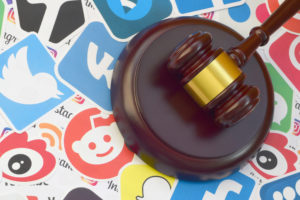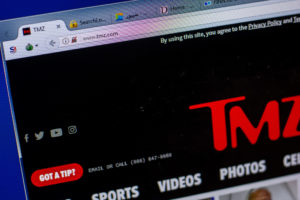
Well, lookie here…Courtney Love won her latest Twitter defamation lawsuit.
Courtney Love’s Social Media Litigation Woes: A History
Back in 2012, notorious trash-tweeter Courtney Love and the “Boudoir Queen,” designer Dawn Simorangkir, were locked in a Twitter libel lawsuit over one of Love’s infamous social media meltdowns.
But before the case made it to trial, they reached a settlement. Love agreed to pay Simorangkir $430,000 and Twitter banned the Hole front-woman for two months.
But the defamation spat between Love and Simorangkir didn’t end with the 2012 settlement. Last May, while on the Howard Stern Show, Love talked about the Twitter defamation case and claimed to have security camera evidence of the designer stealing. Love also called Simorangkir “a whore.” Howard Stern, the King of Shock Jocks, was even taken aback by her claims. He warned, “You can’t just blurt things out.” Well, Dawn must have been listening, because Simorangkir filed yet another social medial libel suit against Love in September 2013. The issue has yet to be resolved a second time.
Love’s Latest Conspiracy Theory Tweets Result In Another Twitter Defamation Case
One night, Courtney Love tweeted, “I was f–ing devastated when Rhonda J. Holmes, Esq. of San Diego was bought off.” Why pillory a random lawyer online? Well, you see, Holmes, (at the time), was Courtney’s attorney. And, as you may have already guessed, Courtney and Rhonda’s relationship was suffering through a bit of a professional rough patch.
Love swears the tweet was never meant to be public. She insists she was merely expressing private disappointment in what she believed was her former lawyer’s betrayal. In her signature self-revelatory bluntness, Love also blamed the problematic tweets on a “lack of sobriety.”
Unimpressed with Courtney’s Twitter quips, Holmes filed a Twitter defamation lawsuit, claiming the 140-character rant harmed her professional reputation.
During the trial, Love’s attorney argued:
- That the plaintiff didn’t show negligence;
- Courtney believed her suspicions about Holmes to be true;
- Because of points 1 and 2, Love’s Twitter statements shouldn’t be deemed defamatory.
Twitter Defamation Upset: Twibel Jury Sides With Love
Legal watchers were certain Love would lose this one. But in the end, she emerged victorious. Why? Because the jury unanimously agreed that the answer to the following question had to be “no”:
“Did Rhonda Holmes prove by clear and convincing evidence that Courtney Love knew [her tweets were] false or doubted the truth of it?”
You see, for a statement to be defamatory, the plaintiff must prove that the defendant acted either negligently or with actual malice. In other words, a statement cannot be defamatory if the would-be defamers believe in the truthiness of their statements. In this instance, the jury believed that Courtney truly thought Holmes was secretly working with a cabal of anti-Courtney estate executives. After all, the Hole singer had been ranting against enemies – imagined or not – for years. (In this particular case, whether or not anti-Courtney Love quislings actually exist doesn’t matter; the fact that Courtney genuinely thinks it exists is the relevant issue.)
After deliberating for several hours, the jury returned with a verdict. While the jurors didn’t believe Love’s statements about Holmes, they did believe Courtney thought she was tweeting the conspiracy gospel. As a result, the gang of 12 ruled in favor of Team Love.
Like the “twinkie defense” before it, perhaps this brilliant bit of defensive arguing also deserves a moniker – let’s go with: “tweet-tin-foil defense.”
Get In Touch With A Twitter Defamation Lawyer
With Twitter’s 140-character limit, the platform is fertile defamatory grounds. If you need to speak with a Twitter defamation lawyer, get in touch today. Kelly Warner has a dedicated social media attorney on staff who can help rectify your situation quickly.
Get in touch today to begin the conversation. The sooner your address the problem, the sooner it can be solved.



Leave a Reply
Your email is safe with us.